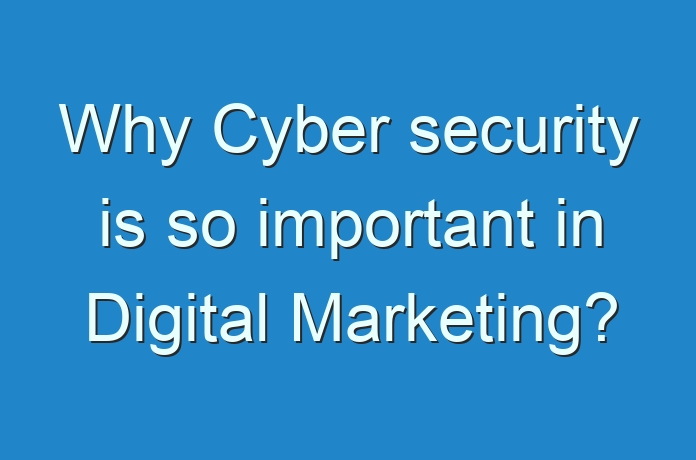
A well planned and executed digital marketing campaign takes a significant amount of investment in terms of effort and time. You have to engage in intensive market research, nail down your target audience, establish the needed contacts, create the required content, plan activities for customer retention and prospect conversions, and create a strategy around how all of this fits your sales cycle.
It is essential to get your digital marketing strategy right for achieving success with your business goals. However, since most of the business and your digital marketing activities are online, do not ignore the risks of cyber security. Cyber security is essential in digital marketing – make sure you understand the different online risks and take adequate steps to keep yourself and your customers safe.
Malware of sorts
When doing anything online, the prime need is to ensure that your information is safe. And, this requirement goes to the next level when you are dealing with business or customer data.
No doubt, the internet has made our lives easier and exciting, and it has become an essential part of all aspects of the business. However, it comes with its own set of potential perils. If a website is malicious, the visitors may get infected just by opening a page on it, without even clicking anywhere.
Here are some of the common forms of malware.
Malvertising
This is another innovative manner in which hackers can enter your system. Malvertising works by installing malware within ads that show up on sites. This malware gets downloaded and installed on your computer when you click on such an ads.
Viruses
Viruses are one of the most common forms of malware that endangers internet users. They spread throughout your network, corrupting your system and data files.
Spyware
Spywares record your data and actions. They send information such as your keystrokes, passwords, emails, and other material to hackers.
Ransomware
This is where the cybercriminals take control of your data and systems. The ransomware perpetrators then demand money in exchange for the release of your hijacked resources.
Malware spread through emails
Be very careful with emails. They may contain harmful attachments and links. You may sometimes get infected just by opening a malicious email, without even accessing the attachment.
Malicious software installed on your server
Hackers may install malicious software on your servers too. This means that your customers may get infected by malware when they access your websites, links contained in your newsletters. Your business is bound to lose current customers, new signups, and revenue once you get the bad reputation of spreading malware.
Make sure that none of your digital marketing efforts opens you and your customers up for malware. You must understand how these spreads and how you can avoid taking risky positions.
The first thing you must do is install the best anti-malware software and tighten up your firewalls as much as possible. Remember, no cost is too much when it saves you from the far higher price you may have to pay for cyber-attacks. Also, be vigilant at all ties and never skip any updates.
Website platform and Email server
Ensure you are using a secure web platform and use the best practices recommended to keep it safe. Newer versions of website software and plugins are critical to keeping your site secured against any known vulnerabilities. Never use any digital marketing software that does not fit in with the more significant security policy used for protecting your systems.
Make sure that the company you use for web hosting keeps customer security as its prime focus. They should be doing things such as system isolation to keep your site protected. Ensure that regular backups are being taken to restore the information in case of any breakdown or breach.
Remember, most hackers are not interested in stealing your emails or deleting them. Their bigger intent is to spread the damage as far as possible, so they are mostly after your email accounts. Spammers have devious designs of using your email server for spreading spam mail. Spamming is a much frowned upon practice, and most ISPs (including software filters) will block your IP address once it is determined to be the source of spam email. Once you get blacklisted, your digital marketing campaigns using email will be severely limited.
If your website, network, or email server gets hacked, stay calm, change all your passwords, and run a full scan on your systems to detect malware. Work with your web host and a competent cyber security team to handle the situation and protect your future systems.
Automated traffic
Most of the traffic your site sees is non-human. Some of the common forms are bots that commit click fraud, spambots, web scrapers that record all your links and page information, etc.
Given the automated nature of online advertising, it is a perfect platform for such bots to exploit. Impersonators can capture user credentials and recreate them. This opens the way for fraudulent sessions, spy bots, and DDoS Distributed Denial of Service) agents. Advertisements that see little human interaction may get hit by such impersonators, thus creating a false sense of traffic count.
One of the ways of protecting yourself is to use botnet detection tools. These check the interaction characteristics against a known list of behaviors of such malicious bots. Businesses need extra protection as sometimes their networks may become a source of such botnet attacks. Another thing you can do is to implement a honeypot. Once this false infiltration opportunity is used, you can capture the botnet signatures responsible for the attack.
Also, share the information of such threats with partners who can help expose the originating IP addresses and uncover false domains. A lot of websites now use CAPTCHAs to test if the user is human before allowing them further access.
Sensitive information exchange
You may be using landing pages as part of your digital marketing campaigns where you may want them to share their personal information. Sometimes, this information may be of value to cybercriminals – they may use personally identifiable information such as name, phone, number, email, and address to spam the users.
The security of information exchange gets even more critical when the customers are asked to enter payment information. If a hacker gets hold of the users’ financial details, there is no telling about the extent of monetary damage they may cause. Use payment gateways to handle any online payments.
Also, Install an SSL certificate on your web server so that all the data transmitted between the user’s browser and your webs server remains encrypted. This ensures that any MITM (Man in the middle) attacks will keep the information protected from being interpreted and misused.
Social Media
Hackers are always after the major social media sites and are not usually interested in your account information. Their primary intent is to create chaos. They will try to change your profile, add false statements, and offensive pictures to offend your followers. Once your social media account is in their hands, cybercriminals may send unacceptable emails, dangerous links, or other kinds of spam to your customers from your account.
Protect yourself by using strong passwords that you keep changing from time to time. Do not use apparent substitutions like replacing Os with zeroes and avoid dictionary phrases. Before posting on your social media handle, please think of all the risks and consequences of your actions. Stay away from supplying personal information and never click suspicious links.
If your digital marketing depends heavily on social media, you must make yourself aware of brandjacking. This is where an unauthorized entity acquires your brand equity by getting access to or assuming your online identity.
Use an excellent social media monitoring tool to track real-time use of your brand. This way, you will be able to spot any suspicious behavior on your social media channels quickly.
Lead data
You are looking to build a trustworthy relationship with your customers, but what if they try to cheat you? Fraud is possible in almost all digital marketing campaigns. You could consider using software to detect fraudulent user behavior and inconsistent data.
Detection is the first step. Your website can do this easily. Look at your customer’s reported zip code, address, phone number, etc. If they do not match, something is not right. Your website should use an elaborate lead validation code/script to prevent this.
Review all login activity, such as the IP address the traffic is originating from. A lot of leads coming from the same IP address may point to fraud. Consider verifying such suspicious leads by sending them to follow up communication such as customer surveys to request further information.
Eventually, if a lead or sale fails your validation process, do not tell them the reason – this will only help them commit the fraud. They will alter the information you found to be problematic and resubmit. The best thing to do is to accept the lead and not give any sales credit for the same. Next, block the IP address you got the lead from and never engage in any business with them.
To summarize, cybercriminals are getting more and sophisticated. They are using advanced software to crawl your website, steal your information, and create havoc. You must protect your social media accounts, email systems, and sites with the best possible safeguards. Keep monitoring your systems for any intrusion or suspicious activity. All your digital marketing activities must include cyber security as a prime concern.





